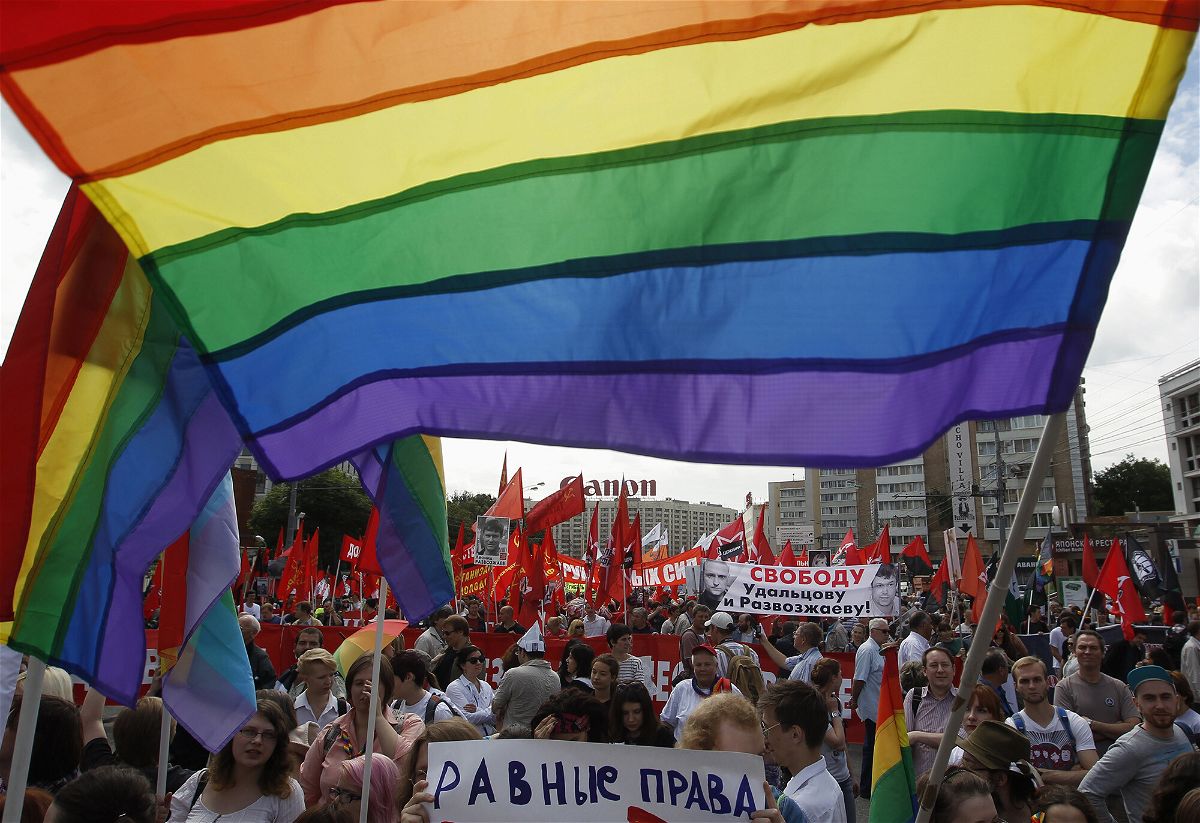Putin signs expanded anti-LGBTQ laws in Russia, in latest crackdown on rights

Gay rights activists take part in an opposition protest march in Moscow
By Ivana Kottasová and Anna Chernova, CNN
Russian President Vladimir Putin on Monday signed into law a bill that expands a ban on so-called LGBTQ “propaganda” in Russia, making it illegal for anyone to promote same-sex relationships or suggest that non-heterosexual orientations are “normal.”
The ban was rubber-stamped by Putin just days after a harsh new “foreign agents” law came into effect, as the Kremlin cracks down on free speech and human rights as its military operation in Ukraine falters.
The new laws significantly broaden the scope of a 2013 law which banned the dissemination of LGBTQ-related information to minors. The new iteration extends the ban on promoting such information to adults as well.
The new laws make it illegal to promote or “praise” LGBTQ relationships, publicly express non-heterosexual orientations or suggest that they are “normal.”
The package of amendments signed by Putin include heavier penalties for anyone promoting “non-traditional sexual relations and/or preferences,” as well as pedophilia and gender transition. Under the new law, it will be banned across the internet, media, books, audiovisual services, cinema, and advertising.
Under the new law, individuals can be fined up to 400,000 rubles ($6,370) for “LGBT propaganda” and up to 200,000 rubles ($3,185) for “demonstrations of LGBT and information that encourages a change of gender among teenagers.”
These fines rise to up to 5 million rubles ($80,000) and 4 million rubles ($64,000) respectively for legal entities.
The law was approved by the Russia’s upper and lower houses in recent weeks.
The European Court of Human Rights ruled in 2017 that the 2013 law is discriminatory, promotes homophobia and violates the European Convention on Human Rights.
The court found that the law “served no legitimate public interest,” rejecting suggestions that public debate on LGBT issues could influence children to become homosexual, or that it threatened public morals.
Homosexuality was decriminalized in Russia in 1993, but homophobia and discrimination is still rife. It is ranked 46th out of 49 European countries for LGBTQ+ inclusion by watchdog ILGA-Europe.
Speaking before Putin signed the bill into the law on Monday, Tanya Lokshina, associate Europe and Central Asia director at Human Rights Watch said: “The 2013 ‘gay propaganda’ law was an unabashed example of political homophobia, and the new draft legislation amplifies that in broader and harsher ways.”
But the broadening of the “LGBT propaganda” law is just the latest in many steps that Putin’s government has taken in recent months to crush the last pockets of opposition, liberal values and free speech in Russia.
A new, expanded version of the 2012 law on foreign agents came into effect last week. While the original version required organizations engaging in political activity and receiving funding from abroad to register as foreign agents and adhere to draconian rules and restrictions, the new law extends that requirement to anyone who has “received support and (or) is under foreign influence”.
In early March, just days after Putin ordered a full-scale invasion of Ukraine, the Russian government adopted a law criminalizing the dissemination of what it called “deliberately false” information about the Russian armed forces. The maximum penalty is 15 years in prison.
The-CNN-Wire
™ & © 2022 Cable News Network, Inc., a Warner Bros. Discovery Company. All rights reserved.
CNN’s Clare Sebastian, Uliana Pavlova and Rob Picheta contributed reporting.
